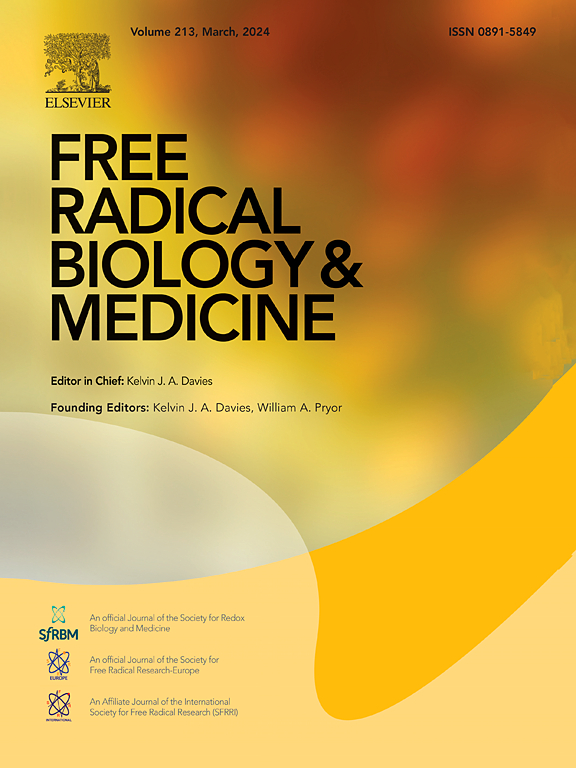Selenoproteome depletion enhances oxidative stress and alters neutrophil functions in Citrobacter rodentium infection leading to gastrointestinal inflammation
IF 7.1
2区 生物学
Q1 BIOCHEMISTRY & MOLECULAR BIOLOGY
引用次数: 0
Abstract
Reactive oxygen species (ROS) play a critical role in modulating a range of proinflammatory functions in neutrophils, as well as regulating neutrophil apoptosis and facilitating the resolution of an inflammatory response. Selenoproteins with the 21st amino acid, selenocysteine (Sec), regulate immune mechanisms through the modulation of redox homeostasis aiding in the efficient resolution of inflammation, while their role in neutrophil functions during diseases remains unclear. To study the role of selenoproteins in neutrophils during infection, we challenged the granulocyte-specific tRNASec (Trsp) knockout mice (TrspN) with Citrobacter rodentium (C. rodentium), a murine pathogenic bacterium. Reduced bacterial shedding during the disease-clearing phase and increased tissue damage and neutrophil accumulation in the colon of the TrspN mice were observed following infection. TrspN neutrophils showed increased intracellular ROS accumulation during ex vivo C. rodentium stimulation and upregulated fMLP or Cx3cl1-induced chemotaxis. We also observed delayed neutrophil apoptosis, reduced efferocytosis of TrspN neutrophils, and increased abundance of apoptotic cells in the colon of TrspN mice. Together, these studies indicate that selenoprotein depletion results in increased neutrophil migration to the gut accompanied by ROS accumulation, while downregulating neutrophil apoptosis and subsequent efferocytosis by macrophages. Such an increase in inflammation followed by impaired resolution culminates in decreased bacterial load but with exacerbated host tissue damage.

硒蛋白组耗竭增强氧化应激和改变中性粒细胞功能在鼠柠檬酸杆菌感染导致胃肠道炎症。
活性氧(ROS)在调节中性粒细胞的一系列促炎功能,以及调节中性粒细胞凋亡和促进炎症反应的解决中发挥关键作用。含有第21个氨基酸的硒蛋白,硒半胱氨酸(Sec),通过调节氧化还原稳态来调节免疫机制,帮助有效解决炎症,但其在疾病期间中性粒细胞功能中的作用尚不清楚。为了研究硒蛋白在中性粒细胞感染过程中的作用,我们用鼠柠檬酸杆菌(C. rodentium)(一种小鼠致病菌)刺激粒细胞特异性tRNASec (Trsp)敲除小鼠(TrspN)。感染后观察到TrspN小鼠在疾病清除阶段细菌脱落减少,结肠组织损伤和中性粒细胞积累增加。在离体刺激中,TrspN中性粒细胞显示细胞内ROS积累增加,fmlp诱导的趋化性上调。我们还观察到TrspN小鼠结肠中性粒细胞凋亡延迟,TrspN中性粒细胞efferocysis减少,凋亡细胞丰度增加。总之,这些研究表明硒蛋白耗竭导致中性粒细胞向肠道迁移增加,并伴有ROS积累,同时下调中性粒细胞凋亡和巨噬细胞随后的efferocytosis。这种炎症的增加伴随着分解能力的减弱,最终导致细菌负荷减少,但宿主组织损伤加剧。
本文章由计算机程序翻译,如有差异,请以英文原文为准。
求助全文
约1分钟内获得全文
求助全文
来源期刊

Free Radical Biology and Medicine
医学-内分泌学与代谢
CiteScore
14.00
自引率
4.10%
发文量
850
审稿时长
22 days
期刊介绍:
Free Radical Biology and Medicine is a leading journal in the field of redox biology, which is the study of the role of reactive oxygen species (ROS) and other oxidizing agents in biological systems. The journal serves as a premier forum for publishing innovative and groundbreaking research that explores the redox biology of health and disease, covering a wide range of topics and disciplines. Free Radical Biology and Medicine also commissions Special Issues that highlight recent advances in both basic and clinical research, with a particular emphasis on the mechanisms underlying altered metabolism and redox signaling. These Special Issues aim to provide a focused platform for the latest research in the field, fostering collaboration and knowledge exchange among researchers and clinicians.
 求助内容:
求助内容: 应助结果提醒方式:
应助结果提醒方式:


